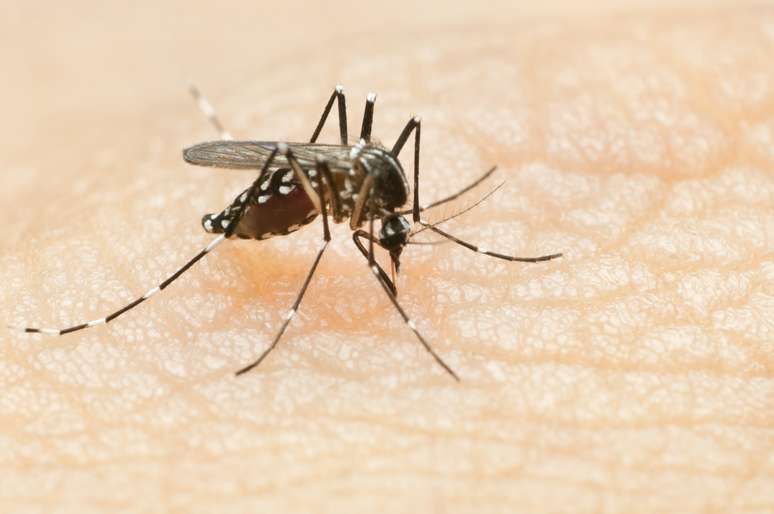Find out how the dengue virus is transmitted, what the incubation period is, and see how the new vaccine against the disease works
html[data-range=”xlarge”] figure image img.img-a50c563d044ea988092aa7d75ff01956rp30oiu0 { width: 774px; height: 514px; }HTML[data-range=”large”] figure image img.img-a50c563d044ea988092aa7d75ff01956rp30oiu0 { width: 548px; height: 364px; }HTML[data-range=”small”] image figure img.img-a50c563d044ea988092aa7d75ff01956rp30oiu0, html[data-range=”medium”] figure image img.img-a50c563d044ea988092aa7d75ff01956rp30oiu0 { width: 564px; height: 375px; }
The Ministry of Health reported that there was a jump in dengue cases in the first months of 2023. Between January and March, there were 210,000 probable cases of the disease. The number is 43.8% higher than that recorded in the same period last year. The region with the highest incidence is the Midwest, with 254.3 cases per 100,000 population.
The dengue virus is a major public health problem in the country. The accumulation of stagnant water contributes to the proliferation of the mosquito and, consequently, to a greater spread of the disease. Its incidence increases in summer, on hot and humid days. Know everything about this infection.
What is Dengue?
Dengue is an acute febrile disease, with a viral etiology and with a benign evolution in the classic form, and serious when it occurs in the hemorrhagic form. Dengue is, today, the most important arbovirus (disease transmitted by arthropods) that affects humans and constitutes a serious public health problem in the world, especially in tropical countries, where environmental conditions favor the development and proliferation of Aedes aegypti , the main vector mosquito.
Dengue virus has four serotypes, generally called DENV-1, DENV-2, DENV-3 and DENV-4. Dengue viruses are transmitted by the female Aedes aegypti mosquito, when it is also infected, and due to the presence of the vector in the disease transmission cycle, any dengue outbreak is directly related to the concentration of mosquito density, i.e. more insects, the more the more likely they are to occur.
Transmission occurs through the bite of Aedes aegypti, in the cycle man – Aedes aegypti – man. After a meal of infected blood, the mosquito is capable of transmitting the virus after 8-12 days of incubation.
Mechanical transmission is also possible when the meal is interrupted and the mosquito immediately feeds on a nearby susceptible host. There is no transmission by direct contact between a sick person or their secretions with a healthy person, or through water or food sources.
Dengue viruses are transmitted by the female Aedes aegypti mosquito, when it is also infected, and due to the presence of the vector in the disease transmission cycle, any dengue outbreak is directly related to the concentration of mosquito density, i.e. more insects, the more the more likely they are to occur. The incubation period varies from 3 to 15 days, with an average of 5-6 days.
Symptoms
Symptoms of dengue can vary from person to person. Some may not experience any reactions, while others have mild to severe conditions. In general, the symptoms presented are fatigue, body pain, fever, loss of appetite, headache, nausea and reddish spots on the body, which are skin rashes. The disease lasts from five to seven days (maximum 10), but the convalescence period can be accompanied by great physical weakness, and last several weeks.
As regards the more severe form, the initial symptoms are similar, but the condition worsens on the third or fourth day of evolution, with the appearance of hemorrhagic manifestations and circulatory collapse. The warning signs that indicate a risk of aggravation are intense and continuous abdominal pain, persistent vomiting, dizziness, especially when standing up, bleeding from the mucous membranes, drowsiness or a lot of irritability in the most serious cases.
Shock usually occurs between the third and seventh day of illness, usually preceded by abdominal pain. Some patients may also have neurological manifestations, such as seizures and irritability. Furthermore, previous or associated conditions such as previous dengue fever, elderly, hypertension, diabetes, bronchial asthma and other serious chronic respiratory diseases may be factors capable of favoring a serious evolution.
Treatment
There is no specific treatment. Treatment is only symptomatic, with analgesics and antipyretics (paracetamol and dipyrone). For mild forms, the patient should be instructed to rest and initiate oral hydration with increased intake of water, juices, herbal teas, and homemade serums. Salicylates and non-hormonal anti-inflammatories should be avoided, as their use can favor the appearance of haemorrhagic manifestations and acidosis.
As for dengue hemorrhagic fever, treatment begins after the patient is hospitalized. Disease prevention can be done in two ways. One for the reduction or control of mosquito infestation, measures to contrast vectors that have been promoted and implemented by the Ministry of Health, which always asks for help and awareness among the population.
Eliminating places that can hold mosquito eggs on surfaces with standing water such as empty cans and bottles, tires, gutters, uncovered water tanks, plant pots, or anything else that can store rainwater.
Attention should be paid to the environment since female A. aegypti tend to live indoors in dark and low environments (under tables, chairs, wardrobes, etc.), where temperatures (ranging between 24 and 28°C) can be found ). and humidity suitable for the adult mosquito.
The other would be the use of an effective vaccine. The National Health Surveillance Agency (Anvisa) recently approved the quadrivalent dengue vaccine. The immunizer was licensed for use in people aged 4 to 60, including those who did not have the disease, in a two-dose schedule, with three-month intervals.
Clinical studies have shown an efficacy of 80.2% against the four serotypes of the disease, in a period from 30 days to 12 months after administration of the second dose. Regarding safety, the vaccine is contraindicated for immunosuppressants, pregnant women and women during the breastfeeding period.
Source: Juliana Oliveira, an infectious disease specialist at Hcor
Source: Terra
Ben Stock is a lifestyle journalist and author at Gossipify. He writes about topics such as health, wellness, travel, food and home decor. He provides practical advice and inspiration to improve well-being, keeps readers up to date with latest lifestyle news and trends, known for his engaging writing style, in-depth analysis and unique perspectives.









